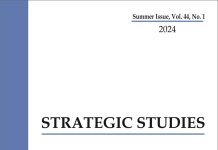Abstract
It can be argued that the overt nuclearisation of South Asia has averted a major military confrontation between India and Pakistan. However, it is difficult to ascertain whether nuclear weapons would totally eliminate chances of a future conventional war escalating into a nuclear exchange. The deep-rooted territorial disputes, water disputes, terrorism, role of non-state actors, and the growing Indian nuclear and conventional capabilities can still cause a major conflict in South Asia. India, using its threat sensitivities as a pretext to punish Pakistan, could launch a limited offensive under its aggressive Cold Start Doctrine (CSD), and can cross Pakistan’s nuclear thresholds. Pakistan, being sensitive to Indian hostility and its conventional superiority, could stop any Indian offensive by retaliating with tactical nuclear weapons (TNWs). Therefore, such mutual crossing of nuclear thresholds could escalate into an all-out nuclear war, which could eventually result in a nuclear winter in South Asia, with catastrophic global consequences. In this regard, this paper tries to find answers to the question that what would be the repercussions of CSD and TNWs on South Asian nuclear thresholds? And what are the prospects of avoiding a nuclear war in South Asia? Finally, the study urges that the technological and doctrinal advancement in nuclear weapons in South Asia should be aimed at ensuring strategic stability, not war fighting.












